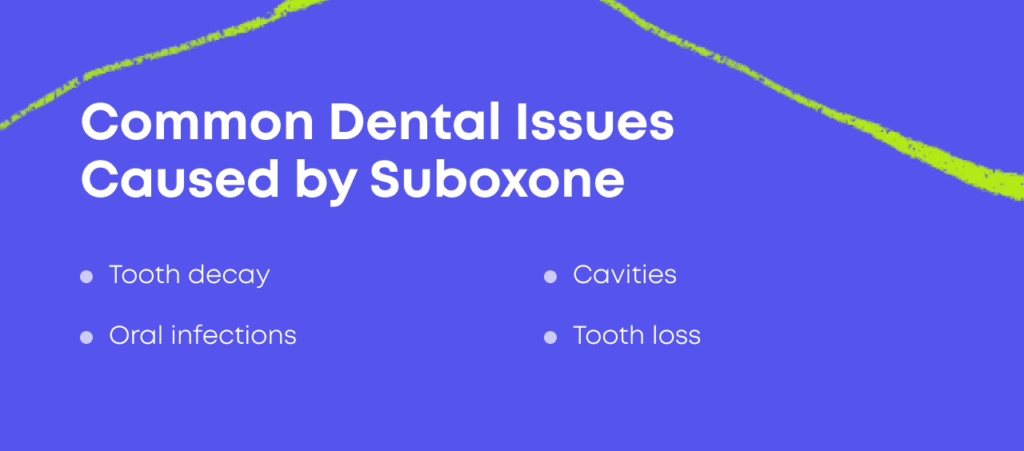Suboxone is dissolved in the mouth under the tongue or against the cheek. People take Suboxone anywhere from 1 to 3 times per day, which means your teeth are exposed sometimes multiple times a day to this medication. Some people develop tooth decay and dental health issues because dissolving Suboxone changes acidity levels inside your mouth.
Dental problems are serious enough that the U.S. Food and Drug Administration (FDA) made a public statement about the issue.[1]
You can take Suboxone and protect your teeth at the same time. A few simple steps and a close partnership with your doctor and dentist can ensure you treat your addiction and oral health at the same time.
Why Do Teeth Decay When Taking Suboxone?
All Suboxone formulations, including strips and tablets, must dissolve in your mouth. The medications remain in close contact with your oral tissues while the strips and tablets dissolve.
Problems could occur due to the following:
- Acidity: Suboxone is acidic, with a 3.4 pH when dissolved in water.[2] That acidic solution could wear away your enamel, allowing your teeth to succumb to bacteria and decay.
- Dryness: Many people using Suboxone have a low amount of saliva.[2] Without enough fluid to buffer your teeth, they’re vulnerable to decay. Food stays in place, and bacteria grows.
- Poor habits: Some people who use Suboxone also smoke, drink sugary beverages, or have limited access to dental care.[3] All of these choices could also contribute to dental disease.

Dental Health Issues Caused by Suboxone
Common problems caused by Suboxone include the following:
- Tooth decay
- Cavities
- Oral infections
- Tooth loss
Some people notice these problems immediately. Their teeth feel sore or fragile, and they may wobble or come out.
Others don’t notice their oral health issues until they sit with a dentist for a routine exam. Dental professionals can spot these problems almost immediately during routine oral exams.

Can I Prevent Tooth Decay From Suboxone?
Oral health problems aren’t inevitable. With care and planning, you can protect your smile while you’re addressing your addiction.
These are good steps to take:
1. Take Tablets/strips Properly
Some people need several Suboxone tablets or strips in each dose. Applying both at once — rather than splitting your pills into multiple doses — could reduce your acid exposures. Talk to your doctor about the proper technique. Typically, people put tablets under the tongue and ensure they don’t overlap before letting them dissolve.
2. Rinse the Right Way
When your tablets and strips are fully dissolved, take a large sip of water, swish it around your mouth, and swallow.[1] This quick rinse can remove any remaining medication and adjust your oral pH.
3. Brush Later
It’s tempting to grab your toothbrush and scrub the acids away. Unfortunately, adding an abrasive toothpaste to teeth softened by acids can lead to advanced tooth decay. Wait at least an hour before you brush.[1]
4. Work With Your Dentist
Tell your dentist that you’re using Suboxone, and point out any history of oral health issues, including cavities. Keep your routine oral health appointments, and contact your doctor right away if you notice problems with your teeth.[4]
Is Tooth Decay from Suboxone Typical?
It is not typical, no. Almost 2.4 million Americans take buprenorphine products, and many of them have no oral health issues.[5] Dental problems affect only a minority of patients taking Suboxone.
However, dental problems are still a risk of taking Suboxone, particularly in patients who are not regularly brushing their teeth, attending their dental follow ups, or engaging in other behaviors like smoking, drinking, or consuming sugary beverages.
Concern for dental problems is not a good reason to avoid Suboxone in patients in whom it would be helpful or even lifesaving to get treatment for an OUD. However, it is always a good idea to take extra care of your oral health and be mindful of the risks if you are taking Suboxone long term for OUD. Ask your doctor about a referral to a dentist if you don’t have one while on Suboxone.
Sources
- FDA Warns About Dental Problems With Buprenorphine Medicines Dissolved in the Mouth to Treat Opioid Use Disorder and Pain. U.S. Food and Drug Administration. https://www.fda.gov/drugs/drug-safety-and-availability/fda-warns-about-dental-problems-buprenorphine-medicines-dissolved-mouth-treat-opioid-use-disorder. January 2022. Accessed November 2022.
- Sublingual Buprenorphine and Dental Problems: A Case Series. The Primary Care Companion for CNS Disorders. https://www.ncbi.nlm.nih.gov/pmc/articles/PMC3907320/. October 2013. Accessed November 2022.
- How the Opioid Epidemic Affects Dental Health—And What Dentists are Doing to Help. Burlington Free Press. https://www.burlingtonfreepress.com/story/sponsor-story/uvm-medical-center/2018/10/24/how-opioid-epidemic-affects-dental-health-and-what-dentists-doing-help/1698908002/. October 2018. Accessed November 2022.
- Buprenorphine: Drug Safety Communication. U.S. Food and Drug Administration. https://www.fda.gov/safety/medical-product-safety-information/buprenorphine-drug-safety-communication-fda-warns-about-dental-problems-buprenorphine-medicines. January 2022. Accessed November 2022.
- Professional Organizations Push for Recall of Buprenorphine Dental Warning. Health Plan of San Joaquin. https://www.hpsj.com/professional-organizations-push-for-recall-of-buprenorphine-dental-warning-february-2022/. March 2022. Accessed November 2022.

Medically Reviewed By Elena Hill, MD, MPH
Elena Hill, MD; MPH received her MD and Masters of Public Health degrees at Tufts Medical School and completed her family medicine residency at Boston Medical Center. She is currently an attending physician at Bronxcare Health Systems in the Bronx, NY where ... Read More
Download Our Free Program Guide
Learn about our program, its effectiveness and what to expect
Related Content
Imagine what’s possible on the other side of opioid use disorder.
Our science-backed approach boasts 95% of patients reporting no withdrawal symptoms at 7 days. We can help you achieve easier days and a happier future.